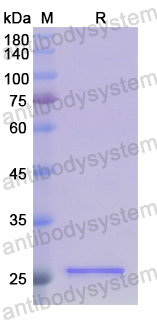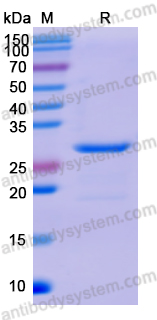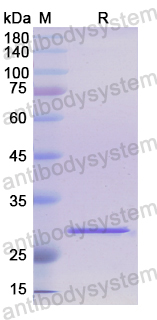Catalog No.
YHA06501
Expression system
E. coli
Species
Homo sapiens (Human)
Protein length
Ser2-Arg223
Predicted molecular weight
26.86 kDa
Nature
Recombinant
Endotoxin level
Please contact with the lab for this information.
Purity
>90% as determined by SDS-PAGE.
Accession
O00233
Applications
ELISA, Immunogen, SDS-PAGE, WB, Bioactivity testing in progress
Form
Lyophilized
Storage buffer
Lyophilized from a solution in PBS pH 7.4, 0.02% NLS, 1mM EDTA, 4% Trehalose, 1% Mannitol.
Reconstitution
Reconstitute in sterile water for a stock solution. A copy of datasheet will be provided with the products, please refer to it for details.
Shipping
In general, proteins are provided as lyophilized powder/frozen liquid. They are shipped out with dry ice/blue ice unless customers require otherwise.
Stability and Storage
Use a manual defrost freezer and avoid repeated freeze thaw cycles. Store at 2 to 8°C for frequent use. Store at -20 to -80°C for twelve months from the date of receipt.
Alternative Names
26S proteasome regulatory subunit p27, 26S proteasome non-ATPase regulatory subunit 9, PSMD9
Novel interaction with PSMD9 regulates DNAJA1 turnover and mitochondrial polarity., PMID:40412052
Molecular and immunological features associated with long-term benefits in metastatic NSCLC patients undergoing immune checkpoint blockade., PMID:39991958
Loss of correlated proteasomal subunit expression selectively promotes the 20SHigh state which underlies luminal breast tumorigenicity., PMID:39814910
Chemoproteomic profiling by bioorthogonal probes to reveal the novel targets of acrylamide in microglia., PMID:39637805
Diminished expression of the ubiquitin-proteasome system in early treatment-naïve patients with rheumatoid arthritis and concomitant type 2 diabetes may be linked to IL-1 pathway hyper-activity; results from PEAC cohort., PMID:39342401
The Role of Z Chromosome Localization Gene psmd9 in Spermatogenesis of Cynoglossus semilaevis., PMID:38928079
PSMD9 promotes the malignant progression of hepatocellular carcinoma by interacting with c-Cbl to activate EGFR signaling and recycling., PMID:38745188
A novel multi-ancestry proteome-wide Mendelian randomization study implicates extracellular proteins, tubular cells, and fibroblasts in estimated glomerular filtration rate regulation., PMID:37774922
The interaction network of the proteasome assembly chaperone PSMD9 regulates proteostasis., PMID:37665644
Comprehensive analysis of PSMD family members and validation of PSMD9 as a potential therapeutic target in human glioblastoma., PMID:37485655
Proteasome Inhibition Sensitizes Liposarcoma to MDM2 Inhibition with Nutlin-3 by Activating the ATF4/CHOP Stress Response Pathway., PMID:37205634
Enhancer RNA promotes resistance to radiotherapy in bone-metastatic prostate cancer by m6A modification., PMID:36632223
PSMD9 is linked to T2D age of onset, years of isolated and combined insulin therapy, irregular menses, and hot flashes., PMID:36524506
A Hypoxia-Associated Prognostic Gene Signature Risk Model and Prognosis Predictors in Gliomas., PMID:34868920
The Silence of PSMC6 Inhibits Cell Growth and Metastasis in Lung Adenocarcinoma., PMID:34239933
PSMD9 ribosomal protein network maintains nucleolar architecture and WT p53 levels., PMID:34077860
Prognostic Value and Molecular Mechanisms of Proteasome 26S Subunit, Non-ATPase Family Genes for Pancreatic Ductal Adenocarcinoma Patients after Pancreaticoduodenectomy., PMID:33525943
PSMD9 expression correlates with recurrence after radiotherapy in patients with cervical cancer., PMID:32565983
Proteasome modulator 9 (PSMD9) gene rs14259 polymorphism in Alzheimer's disease., PMID:32356429
A Novel Determinant of PSMD9 PDZ Binding Guides the Evolution of the First Generation of Super Binding Peptides., PMID:31287951
An integrative systems genetic analysis of mammalian lipid metabolism., PMID:30814737
Two mechanisms involving the autophagic and proteasomal pathways process the metastasis suppressor protein, N-myc downstream regulated gene 1., PMID:30763642
Conformational Landscape of the p28-Bound Human Proteasome Regulatory Particle., PMID:28689658
Proteasome system dysregulation and treatment resistance mechanisms in major depressive disorder., PMID:26624926
T2D and Depression Risk Gene Proteasome Modulator 9 is Linked to Insomnia., PMID:26166263
Caloric restriction and intermittent fasting alter hepatic lipid droplet proteome and diacylglycerol species and prevent diabetes in NZO mice., PMID:25645620
Dysbindin-associated proteome in the p2 synaptosome fraction of mouse brain., PMID:25198678
Histone deacetylase 3 promotes pancreatic cancer cell proliferation, invasion and increases drug-resistance through histone modification of P27, P53 and Bax., PMID:25070540
Discovery of novel interacting partners of PSMD9, a proteasomal chaperone: Role of an Atypical and versatile PDZ-domain motif interaction and identification of putative functional modules., PMID:25009770
A novel role for the proteasomal chaperone PSMD9 and hnRNPA1 in enhancing IκBα degradation and NF-κB activation - functional relevance of predicted PDZ domain-motif interaction., PMID:24720748
PSMD9 expression predicts radiotherapy response in breast cancer., PMID:24673853
Proteasome modulator 9 gene SNPs, responsible for anti-depressant response, are in linkage with generalized anxiety disorder., PMID:24648162
Involvement of Bag6 and the TRC pathway in proteasome assembly., PMID:23900548
Pathway analysis of a genome-wide association study in schizophrenia., PMID:23644028
Overweight condition and waist circumference and a candidate gene within the 12q24 locus., PMID:23282078
Proteasome modulator 9 and depression in type 2 diabetes., PMID:22934761
Hath1 inhibits proliferation of colon cancer cells probably through up-regulating expression of Muc2 and p27 and down-regulating expression of cyclin D1., PMID:23464457
Proteasome modulator 9 is linked to microvascular pathology of T2D., PMID:22015693
Proteasome modulator 9 SNPs are linked to hypertension in type 2 diabetes families., PMID:21871126
Proteasome modulator 9 and carpal tunnel syndrome., PMID:21862167
PSMD9 is linked to type 2 diabetes neuropathy., PMID:21813292
Proteasome modulator 9 gene is linked to diabetic and non-diabetic retinopathy in T2D., PMID:21728808
Hypercholesterolemia and a candidate gene within the 12q24 locus., PMID:21554682
Proteasome modulator 9 and macrovascular pathology of T2D., PMID:21496327
Bridge-1 is expressed in human breast carcinomas: silencing of Bridge-1 decreases Smad2, Smad3 and Smad4 expression in MCF-7 cells, a human breast cancer cell line., PMID:21448710
T2D-nephropathy linkage within 12q24 locus., PMID:21439668
PSMD9 is linked to MODY3., PMID:20069546
PSMD9 gene in the NIDDM2 locus is linked to type 2 diabetes in Italians., PMID:19877155
Bridge-1 is expressed in human granulosa cells and is involved in the activin A signaling cascade., PMID:19782349
The roles of the PDZ-containing proteins bridge-1 and PDZD2 in the regulation of insulin production and pancreatic beta-cell mass., PMID:19275670



